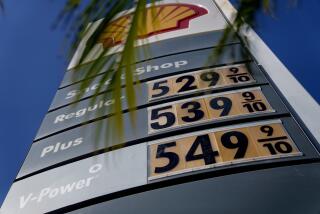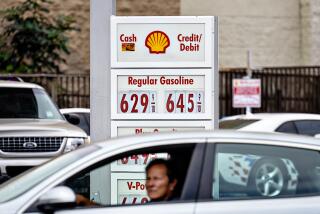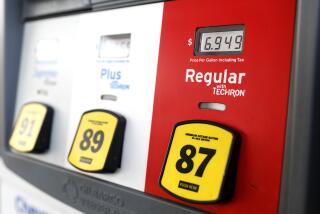Rising gasoline prices fuel the growing appeal of compressed natural gas vehicles
With no end in sight for rising gasoline prices, cars and trucks that run on compressed natural gas — fuel that’s about half the cost of gasoline — are getting another look.
Los Angeles commercial real estate broker Ted Simpson recently snapped up a Honda that runs on CNG, which in the U.S. has been better known for powering public transit buses and delivery trucks.
“I did not want to be hostage to what I believe will be rapidly escalating oil and gasoline prices,” said Simpson, who drives hundreds of miles a week, covering a territory that ranges from San Diego in the south to Santa Barbara in the north. He’s been able to fill up his vehicle for the equivalent of about $2.25 a gallon. CNG costs about $2.10 to $2.70 at Southern California filling stations.
Simpson says his Civic GX has another advantage: Natural gas vehicles, which are less polluting than conventional gasoline autos, are eligible for California carpool lane permits through January 2015.
But while demand is rising, there just aren’t many vehicles to choose from, so a growing number of consumers are purchasing Ford’s old CNG Crown Victoria and looking at retrofitting used natural gas cars, creating an aftermarket for such autos.
For the moment, Honda is the only major automaker selling natural gas passenger cars in the U.S.
Honda, which makes the CNG-powered Civic GX in Indiana, has sold a record number so far this year. Although the volume was small — 643 — it was almost triple the number sold during the same period a year earlier, and the company expects to run out of the cars this summer as it gets ready to sell a larger, redesigned version this fall. The current version gets the equivalent of 24 miles per gallon in city driving and 36 mpg on the highway. The next-generation vehicle is expected to have better fuel economy.
Honda wants to double annual production to at least 2,000 and maybe more, depending on parts availability from earthquake-stricken Japan. The cars list for $25,490 and are sold at 139 dealers in 33 states. Honda plans to certify more dealers to service and sell the cars this year, pushing it into more regions where there are natural gas filling stations, Honda spokesman Eric Rosenberg said.
“The interest in this car has grown significantly,” he said, which is why the automaker plans to pack it with more options, such as a navigation system and rear stereo speakers and aluminum wheels.
Simpson and drivers such as Wilson Avalos, who traded in a Toyota Prius hybrid for a CNG Civic last month, didn’t have a lot of choice. Avalos bought the Civic so that he can use carpool lanes for the 500 miles he drives weekly as a sales representative.
“I liked the Prius better,” Avalos said. The Prius was more spacious, had better fuel economy and still provided the convenience of being able to use regular gas, he said.
But Avalos and Simpson said there are enough freeway-close natural gas filling stations to make driving the vehicles in Southern California practical. Many consumers also install home filling stations in their garages, connecting a natural gas pump to their existing gas piping. That slices the cost of the fuel to the equivalent of about $1.43 a gallon. But the pump is expensive — about $6,000 for the device and installation, minus a $1,000 federal tax credit for the purchase of a natural gas vehicle home refueling system.
Ford Motor Co. Chief Executive Alan Mulally said natural gas technology hasn’t caught on domestically because automakers find it too difficult to make a cost-competitive passenger car with the type of trunk space and interior that consumers expect. Compressed gas storage takes more room in a car than conventional gasoline tanks.
“For big trucks going back and forth across the U.S. it makes a lot of sense, but it is tough to package for autos,” especially smaller cars, Mulally said.
Some consumers, not realizing that many municipal buses and taxicabs run on natural gas, also mistakenly believe that a CNG vehicle is less safe than a conventional gasoline auto.
Despite environmental and price advantages, natural gas powered passenger cars remain an almost immeasurable segment of the U.S. auto fleet.
With the exception of the Civic, most CNG vehicles are marketed for commercial use — for delivery trucks, cargo vans, trash trucks and other vehicles.
Although they don’t currently sell natural gas passenger cars, General Motors Co. and Ford both have CNG offerings in the truck and cargo van segments. AT&T Inc. said last month it would purchase 101 new CNG-powered Chevrolet Express vans for its customer service fleet as part of a larger alternative-fuel initiative. Chrysler Group said recently that it planned to develop natural gas vehicles for the U.S. market.
Many alternative-fuel proponents pitch compressed natural gas as an environmentally friendly counterpart to conventional gasoline vehicles — it emits less carbon dioxide when burned — especially for commercial vehicles that return to a home base where they can easily be refueled.
CNG production is also almost entirely domestic, making it politically and economically more palatable than imported petroleum. About 85% of the CNG used in the United States is produced domestically.
Still, the fuel is not without critics. A number of states are looking at whether drilling practices designed to free the gas from rock formations can contaminate water tables. Other critics say that the amount of natural gas leaking into the atmosphere from drilling facilities and pipelines greatly diminishes its environmental advantage over other fossil fuels.
Nevertheless, consumer interest in converting vehicles to CNG is growing.
Depending on state regulations, a standard passenger car can be converted to natural gas for about $6,000. In California, the conversion can cost triple that amount because of stringent Air Resources Board regulations and certifications to ensure that the modified vehicle does not produce more emissions than the standard gasoline model.
That’s killed off the business in the state, except for larger commercial and municipal vehicles, said Bruce Eikelberger, owner and president of Alternate Fuel Technologies, a natural gas conversion shop in Huntington Beach.
Nonetheless, he still gets dozens of consumer inquiries daily.
“It is crazy,” Eikelberger said. “I have gotten to the point where I screen my calls. They would eat my day up if I allowed it. And unfortunately I have to tell them that there are very few things that can be converted and it is very pricey.”







